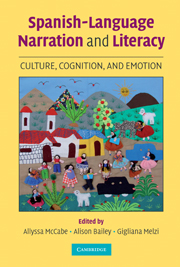Preface
Published online by Cambridge University Press: 05 June 2012
Summary
The initial idea for this book was simple: Alison suggested an edited volume that would recognize the impact Allyssa McCabe has had on two generations of researchers focusing on the study of narrative development. From the start, it seemed critical that Allyssa should be part of the editorial process – who better to make the book a strong contribution to the field? The extension of much of the pioneering work of Allyssa and her colleagues in the 1980s to populations of preschool and school-age children who do not have English as a first language made the choice of Spanish-language narration a natural one. Many of Allyssa's former students were concentrating on both the formal and informal contexts of narrative development in children from diverse backgrounds outside the U.S. mainstream – indeed, some outside the United States entirely. Contacting them and others who have been influenced by Allyssa's work to contribute chapters to the proposed volume set the book in motion.
AUDIENCE: FOR WHOM IS THIS BOOK WRITTEN?
We see a number of audiences for this book: students of language development in speech-language pathology, linguistics, and psychology, as well as those involved in literacy acquisition in preschool and elementary education. The book could readily serve as the main text of a graduate-level seminar devoted to the study of narrative development in Spanish-speaking children, as well as function as an auxiliary text in a course on narrative development or language development more broadly written.
- Type
- Chapter
- Information
- Spanish-Language Narration and LiteracyCulture, Cognition, and Emotion, pp. xiii - xivPublisher: Cambridge University PressPrint publication year: 2008



